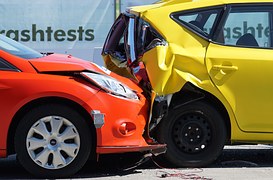How To Prove The Other Driver Was At-Fault For A Car Accident.

It is usually clear in the case of car accidents which vehicles were involved -although who was at fault may be hotly disputed. In fact, experienced Baltimore personal injury lawyers will tell you that the mere fact that an accident happened does not mean someone was at fault. But what about a situation where it is not entirely clear how an accident happened, the vehicles involved, or where the specific mechanism of the accident is not clear [e.g. a car running off a roadway with dry pavement under good weather conditions [Haines v. State, 202 A.2d 364] or a pedestrian hit by a car while standing on the side of a road [UCJFB v. Bowles, 334 A.2d 532]. In such circumstances, the law may provide a shortcut to proving who was at fault, or exactly how they were at fault.
If the event is one that would not normally occur without negligence, the cause of the event was an instrumentality causing the harm was within the exclusive control of a defendant, and no one else, including the injury victim, could have caused the accident, then Res Ipsa Loquitor [“the thing speaks for itself”] permits an inference that the defendant was the cause of the harm.
Of course that this is only half the battle. The defendant then has the opportunity to present a reasonable alternative explanation as to the cause of the harm- that does not involve negligence. I attorney Eric T. Kirk can advise you, the jury can accept that explanation, and give a defense verdict, or applying Res Ipsa Loquitor, find the defendant liable, even without direct proof of negligence.
Maryland courts have applied this notion, although not employing the specific Latin phrase in the context of rear-end collisions. “We conclude that a true evidentiary presumption of negligence arises where a motor vehicle is lawfully stopped on a highway awaiting for traffic to clear before entering an intersecting highway and that vehicle is suddenly struck from behind by another vehicle… From that presumption, a trier of fact may reasonably infer negligence on the part of the driver of the following vehicle.”1 The law considers this to be a rebuttable presumption, meaning the defendant must offer a plausible, non-negligent reason has to why he or she hit the car in front.



